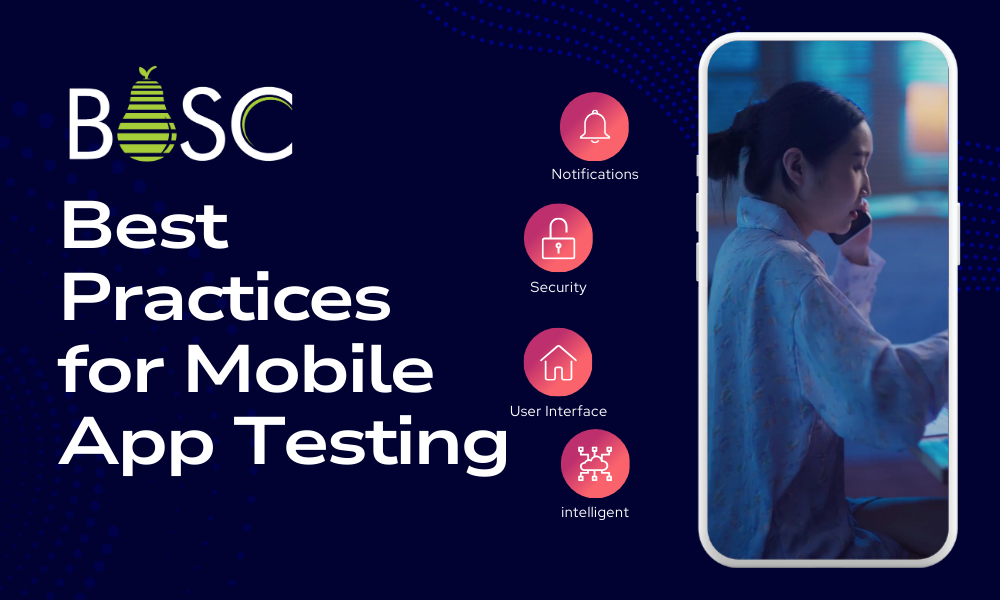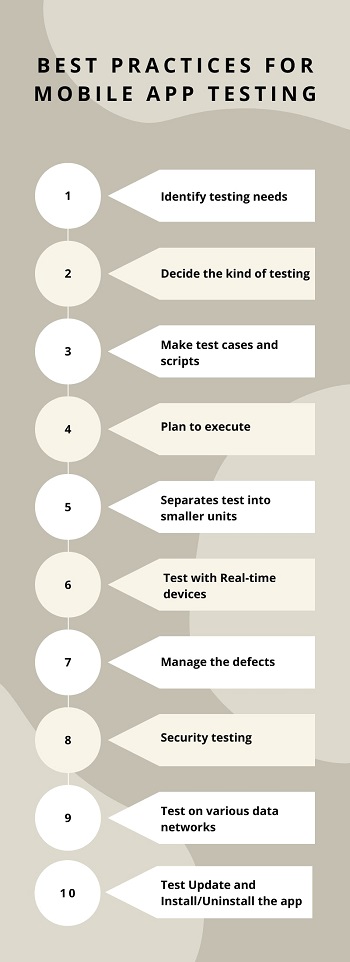
Top 10 Best Practices for Android Mobile App Testing 2024
What is Android app testing?
Android app testing is the assessment of apps designed for the Android OS, focusing on their functionality, user experience, and reliability. Android app testing evaluates an app’s function, ease of use, and reliability on the Android platform. It aims to guarantee quality, and performance on diverse Android devices—covering different screen sizes, resolutions, and hardware—and deliver a smooth user experience.
Mobile app testing is time-consuming and expensive if it needs to be done properly. You will find many best practices for improving your mobile app strategy if you search on Google.
Additionally, mobile app testing is the most critical task of your development process to ensure that your users will have a positive experience when they utilize your mobile application. It is necessary to ensure that the user experience is awesome for every customer every time they use your app, starting from the very first try.
This article will discuss everything related to Android app testing, from the necessity to the challenges that testers may face. Let’s see!
Why is Android mobile app testing necessary?
The Android-supported mobile phone market is growing speedily with its increased usage. However, the growth in Android Smartphone and tablet sales is completely responsible for its growth and the popularity of Android apps. Hence, creating high-quality Android apps that meet your users’ needs is necessary.
The Google play store has many apps that give similar functionalities and are riddled with errors that impact an app’s performance. However, a certain percentage of Android apps are rejected during the app submission. These factors have made Android mobile app testing necessary for Android app development.
What are the advantages of Mobile App Testing?
1. Ensures Proper Functioning Of the App
The QA process is to make sure that the solution is performing seamlessly. Moreover, QA experts test whether the users can successfully download the app to multiple devices. Hence, they use real devices for testing the app, which has come up with the proper functioning of the product.
2. User experience
A specialist puts themselves in the place of the app users and will identify the look and feel of the solution. It uses an app to know its navigation is intuitive and logical. In addition, it checks whether the app’s usage is convenient for the users in different situations. Hence, in this way, it predicts whether a consumer will prefer to use the app or uninstall it from that mobile.
3. Increases Customer Loyalty
The easy usability and proper functioning of the app and customer satisfaction will take the rise. In this way, analytics helps to reach a greater audience and craft the industry’s good reputation.
4. High Revenue
A testing procedure is in demand from its initial stages in the step-by-step procedure of mobile app development, but it helps to avoid fixing the issues and rebuilding the product at the last stage. Thus, it saves time, diminishes total cost, and permits rapid time-to-market. Therefore, by cooperating with your testing experts, you may get the best reviews of your app.
5. Reduce Testing Time
Manual tests demand a significant amount of time and work. However, analysts become capable of running multiple tests in a very short period. Automation testing improves testing speed and efficiency.
6. Reduces App Development Cost
Automated app testing is used, and it lowers the price of an app development project. Thorough testing is the major cause behind the cost saving, which lowers bugs found after a deployment.
Launching the app has defective functionalities that lead to user reviews, app uninstallation, and a negative impression of your brand. Hence, remember to test your app thoroughly from the initial stages of development.
7. Faster App Development
The automated testing with an Agile Development process will help you deliver fast app development, leading to fantastic results and increased ROI. Automation testing reduces app development time and life cycle, which leads to speedier mobile app development.
Why is mobile app testing so important for enterprises?
It saves the app from unexpected issues and offers many benefits with mobile app testing services. Let’s see some of them below:
1. Get built full-fledged solution:
Mobile app testing ensures that an app’s functionality will work accordingly when the users navigate via an app.
2. Uplifts brand image:
Mobile app testing aids you in delivering high-quality apps to the end users to keep them engaged and increase their trust in the brand, uplifting the brand image in the market.
3. Improves an app UI:
During mobile app testing, testers test a product from an end-users perspective and give the overall app experience to a user. Testers will validate user interface compatibility for particular devices of varying screen sizes to ensure an app is convenient and easy to use.
4. Enhances the app quality:
Mobile app testing helps improve the app’s overall quality by removing the bugs that impact the app’s functionality, security, performance, and so on.
Also Read: Enterprise mobile app development complete guide 2022
Which are the best practices for mobile applications?
Android mobile app testing usually goes via multiple stages to give flawless and smooth app development and release. You must follow some of the leading practices, which are explained below:

1. Identify testing needs
Testers identify which things to test and which to keep as the top priority during the mobile app development process after deciding the scope and test coverage of test cases.
2. Decide the kind of testing
Once all testing is required to be identified, the testers usually must identify the type of tests performed on mobile apps. Hence, several types of mobile tests are performed on the new mobile apps, including functional testing, regression testing, performance, speed, usability, and many more.
3. Make test cases and scripts
It involves the development of test cases and automated test scripts. Testers leverage test automation and QA automation services to give test cases that cover all the critical areas and functionalities of application development.
4. Plan to execute
Testers must decide whether to automate or manually execute the test scripts depending on software testing needs. Testers leverage the test automation services as per app testing requirements to perform the mobile automation testing and the software quality assurance outcomes with faster time-to-market and faster release.
5. Separates test into smaller units
Testers divide their test case into small parts so that all the features and functionalities are covered, and the error-free product is delivered to the end-users.
6. Test with Real-time devices
Simulators and Emulators are leveraged during the app development and will quickly and efficiently test the app. By understanding the importance of testing in the application development on real-time android devices before submitting it to the play store, the testers may use emulators to simulate the mobile browser environment and OS emulator from Android. Therefore, it helps them to know how the app looks-and-feel and performs on real gadgets.
7. Manage the defects
Testers must log their bug in the project management system so that app developers and the other team members understand the major issues and the priority to fix them as early as possible.
8. Security testing
Essential and sensitive data is related to the vulnerabilities to ensure that an app remains protected from malware attacks and fraudsters. Thus, security testing ensures an app must be free from threats to save it from any loss.
9. Test on various data networks
Making an app perform optimally in various network conditions is all-necessary to give worldwide acceptance. Hence, it needs to test the app on distinct data networks like 2G,3G,4G, and 5G networks to test the application’s loading time on multiple data networks.
10. Test Update and Install/Uninstall the app
The user may face a problem when the app is uninstalled or updated like the data needs to be cleared completely from the mobile device. It needs the android tester to check the update and install/uninstall the procedure, which does not need the interface with the user experience.
Also Read: Best Tools To Use For API Testing In 2023
What are the challenges and issues faced by testers during mobile app testing?
1. Testing different screen sizes
The screen size of mobile phones differs like iPhone from Android smartphones and others. Testers must check all the various layouts and elements against pixel densities, which is very time-consuming.
2. Changing customer requirements
Usually, changing consumer demand is another challenge testers may face with mobile app testing. For example, minimal design is imperative for modern users, but the older generation still needs to welcome it happily.
3. Battery Consumption
Mobile apps tend to consume the battery life speedily when they remain the app open in the background and the user unknowingly. To prevent excessive battery drainage, better consumption testing for the different devices under different conditions is challenging for testers.

Conclusion
This blog has covered the leading Practices for Android app testing that are most useful for every mobile app developer and tester. If you want help with mobile app testing, connect with our experts today! BOSC Tech Labs gives the best mobile app testing services for your product.
Frequently Asked Questions (FAQs)
1. What is the scope of mobile app testing?
This testing aims to verify that a mobile application is free of errors and problems. It needs in-depth knowledge of mobile phones and how the app can succeed.
2. What is the Android testing API?
The Android Instrumentation API permits you to run a test project and a normal Android project in a similar process so that a test project can call all the methods of an Android project directly. Hence, we should place these tests in the app/src/androidtest/java/folder instead of the app/src/test/java/folder.
3. Can the mobile testing be done manually?
Manual testing uses emulators and simulators, and selecting the desired device helps the mobile apps run flawlessly. It uses real device clouds or sets up the device lab within your organization.
Schedule a Call Now